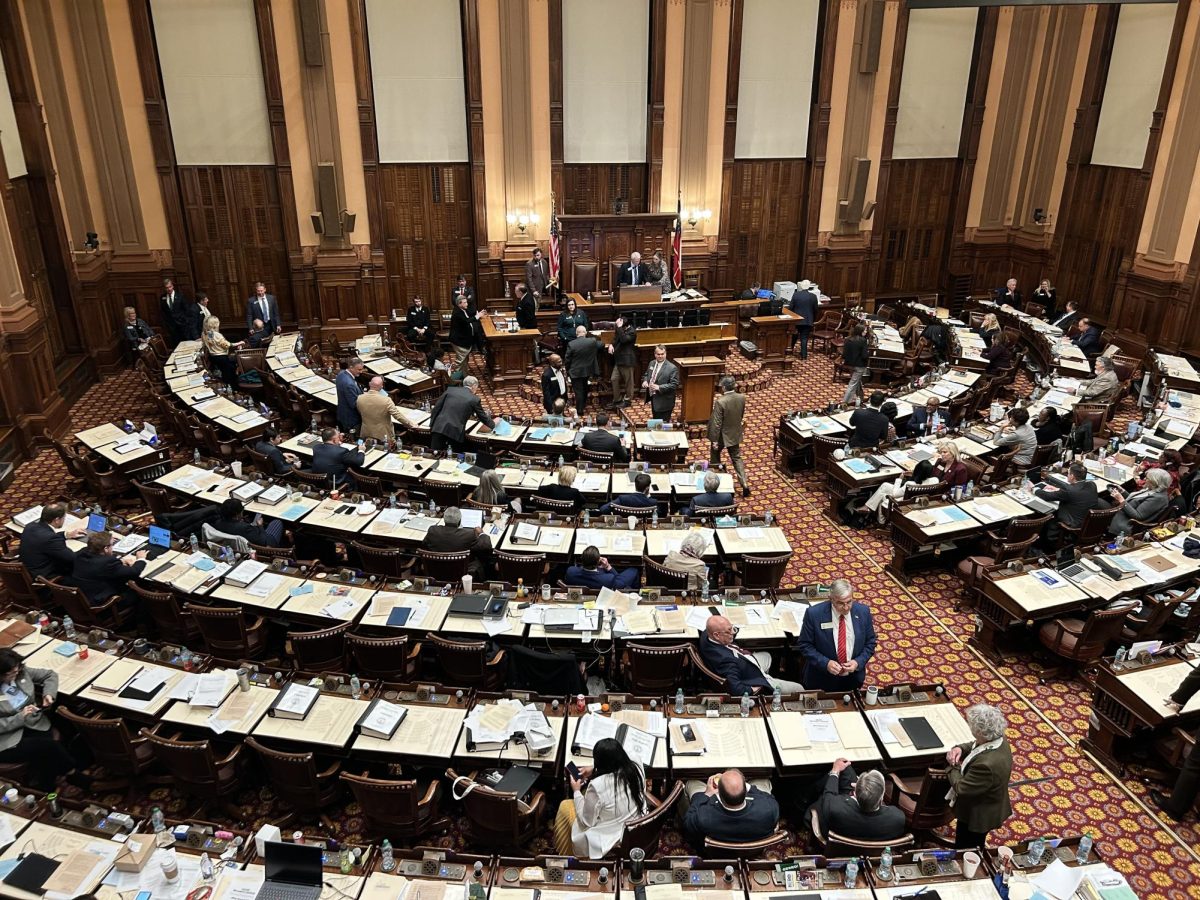Diversity, Equity, Inclusion programs under threat, community reacts

The U.S. Department of Education issued a memo last month to American colleges and universities with an ultimatum to remove their diversity, equity and inclusion initiatives by month’s end or risk losing federal funding.
This memo represents an expansion on the 2023 Supreme Court decision to end affirmative action, declaring it unconstitutional to use race as a factor in college admissions. Martha Ward, the Co-Chair of the Emory University School of Medicine Admissions Board, believes race is a useful tool for holistic review of an applicant.
“[The idea of affirmative action is] challenging because there are a lot of factors that go into the systemic oppression of people of color that we can’t measure in all of the ways,” Ward said. “I do think that it is a good thing to be able to consider race and ethnicity in the overall decision and in determining what sort of variety and diversity of student bodies that any institution is going to be able to have.”
DEI encompasses all policies and initiatives aimed at increasing representation in educational institutions, workplaces, and other areas of society. Junior Naomi Kester expressed concerns about the impact of DEI on both education and the job market.
“I believe that DEI rollbacks will negatively impact the job market and that the reasoning for these rollbacks is rooted in systemic racism,” Kester said. “The idea that people of color have it easier due to DEI is completely untrue and shows a lack of critical thinking. Black women are some of the most hardworking people who, despite DEI, had to succeed 10 times more to be recognized.”
The announcement of the DEI rollback has caused some confusion about the effect this will have. Midtown’s college counselor Rohini Bose said everyone is still figuring out what will be impacted at universities.
“We are finding out real-time, along with everybody else, exactly the breadth of the programs that the elimination of DEI will impact,” Bose said.
Kester said she is concerned about DEI rollbacks impacting her certain educational prospects.
“While I’m fearful the rollbacks might impact college opportunities, all I can hope is that my academics and extracurriculars can support my application,” Kester said.
Colleges and universities across the country are removing DEI terminology from their websites. While Emory has not removed its office of diversity, equity and inclusion, Ward is uncertain about the future of DEI at Emory.
“Previously, we had a dean that supported diversity, equity and inclusion, and there was an entire part of the medical school devoted to those initiatives,” Ward said. “There’s been some change in language, and there’s also been concern for how we are going to continue to do work that supports a diverse physician training pool and a lot of learners who have different life experiences. So, right now, while we have the whole office that supports that, don’t know what the future is going to look like.”
While federal funding is most often associated with public institutions, private institutions rely on federal dollars, as well. Emory received more than $485 million from the National Institutes of Health in 2023. Additionally, many students depend on federal funding for their financial aid.
“There is a huge amount of reliance on funding from the government to support the mission of the university,” Ward said. “We’re paying careful attention to that, while also trying to balance the core mission of education, in general, and, specifically, for physicians, in making sure that the doctors that we’re producing, that we’re educating, represent the community that they’re serving. There is a little bit of a struggle between the things that the government is saying and some of our mission-driven work.”
According to the memo, “a school may not use students’ personal essays, writing samples, participation in extracurriculars, or other cues as a means of determining or predicting a student’s race and favoring or disfavoring such students.”
Senior Hadya Khpulwak believes this limits students’ abilities to express their identities through their applications.
“Allowing students to talk about their background in their college application is extremely important,” Khpulwak said. “For me, sharing my experiences as an Afghan allows me to talk about the challenges I’ve overcome and the resilience I’ve built over the years. It allows admissions officers to understand me as a person and not just for my grades and test scores. It also helps colleges recognize the unique perspectives that can be brought to their college campuses, which can encourage open-mindedness and understanding and foster a more inclusive environment.”
Ward said some race-based experiences are important parts of an application.
“We value the experiences that people have that make them unique and that help them to stand out as applicants,” Ward said. “There are definitely people who come to medicine because they’ve seen health disparities, and we value that very much, particularly, because it allows people to find a lot of passion for the work they do. We do value those experiences if they align with the mission of the university, which is to educate physicians who are going to serve the community and all of the different research, clinical service and education that the university supports.”
Bose said she is unaware how many students mention race in their essays.
“I also have no idea how many students write about their race in essays — it is not something we keep track of or even have enough of a sample size (as far as students who show us their essays) to collect data about,” Bose said.
Looking beyond personal concerns, Kester also emphasized the importance of DEI policies in shaping a more inclusive educational environment.
“If I were to talk to policymakers, I would say that DEI is crucial to helping kids receive a well-rounded education and increasing diversity in teachers can help more kids feel safer in their school environment,” Kester said.
The Department of Education was created in 1979 under President Jimmy Carter to “ensure access to equal educational opportunity.” Kester believes students receive a better education when they’re with diverse peers.
“Surrounding yourself with people who are the same as you creates a bubble that makes it hard to expand your thinking or feel empathy for others who aren’t like you,” Kester said. “Part of the college experience is meeting new people, and by doing that with a diverse student body, people also become more open-minded.”
Khpulwak believes a student’s background is a part of who they are as a person and college applicant; she thinks if colleges remove essays referencing backgrounds, they will not be able to fully assess each applicant.
“Removing personal essays and essays referencing background could limit diversity in the student body,” Khpulwak said. “Removing these essays will make it difficult for admissions officers to fully understand the context of a student’s experiences and challenges they’ve overcome, making it harder to recognize students that may bring unique perspectives and experiences to college campuses, ultimately impacting understanding and inclusivity with our communities.”
Sen. Marty Harbin sponsored Georgia Senate Bill 120, which would prevent K-12 schools and colleges from maintaining or promoting DEI programs and activities in the state. Georgia Minority Leader Sen. Harold Jones is worried about the bill’s vague language.
“The way [the bill is] written right now, it possibly could not teach history at all promoting ideas that talk about race or even reference race or gender and things of that nature,” Jones said. “How could you teach history at all if you’re just talking about references? So, that becomes problematic. Our concern is history classes, but it could also ban student unions because the key language says any reference to race, gender, sexual or anything would be [banned]. It’s very, very troubling.”
Ward is worried about the implications of certain history lessons being removed from the public school curriculum.
“Where we came from still has effects on the way we think consciously and unconsciously about other people,” Ward said. “We need to actively understand the cues and aggressions that exist in our current society towards people who don’t have the dominant social identity. We will never change towards creating equity if we’re not understanding where there is a lack of equality and a lack of equity in the way that we treat other people and the way that we reward and promote the lives of people who have the dominant social identity right now, mainly like white men.”
The bill was on the voting agenda on Crossover Day, when bills crossover between the Senate and the House, but Harbin said the bill needed some changes. While lawmakers failed to move the bill forward, SB 120 could be revived before the end of the session on April 4.
“Even though a bill may not cross over, what can happen is a House bill can come over to us,” Jones said. “You look at the House bill and have something to do with education, and somebody can take that language and pull it out and put this language in it. That’s always still a possibility. Even though it may not pass today, that doesn’t mean it’s for dead until we actually sign out.
Kester noted the positive influence of Midtown’s diverse teaching staff.
“I believe the teaching staff at Midtown is diverse and positively impacts my learning experience,” Kester said. “Being able to be taught by so many different teachers with different life experiences and even be taught by people who look like me is an extraordinary feeling.”





























